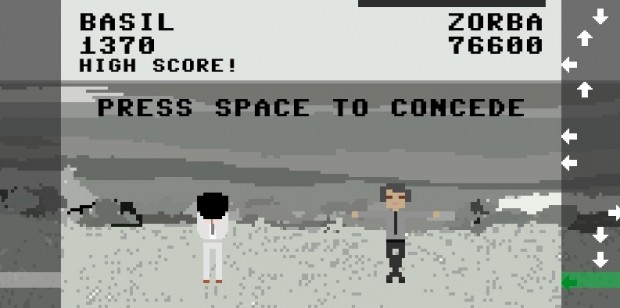An iconographic and text archive related to communication, technology and art.
☛ Pippin Barr: ZORBA the video game, November 2011. Flash is required to play the game. © 2012, Pippin Bar.
Here’s how the author of this atypical video game introduces ZORBA:
Dance?! Did you say dance?! Come on, my boy! Together! Let’s go! Again! Down! Boss… I have so much to tell you! Now’s your chance to go head to head in a furious Greek dancing contest against Zorba himself!
If you only have two or three minutes to spare, go ahead and give it a try. Don’t forget to turn up the volume.
The game is inspired by Cacoyannis’s film Zorba the Greek (1964, also known as Alexis Zorba: see IMDb) which itself is an adaptation of the novel Zorba the Greek (Βίος και Πολιτεία του Αλέξη Ζορμπά, 1946) by the great Greek author Nikos Kazantzakis.
But why make such a game in the first place? Well, for one he is Pippin Barr, author of such games as Safety Instructions (the first of Pippin’s game I played: I died pretty quickly), The Artist Is Present (which I played for half an hour: basically staying in line, waiting for my turn) and Let’s Play: Ancient Greek Punishment (it hurts). And more.
Pippin Barr also wrote a couple of posts documenting and detailing the development of the game ZORBA (as he always does with the games he creates, to my knowledge). Here, he explains how he got the idea to do it in the first place:
In terms of its “creation myth”, the game came up because Rilla and I were in Venice for the Venice Biennale, cultured souls that we are. We were walking through the Piazza San Marco and, as there usually are, there were bands playing in a couple of the (crazy expensive) restaurants. A huge number of tourists were grouped around one particular band, which started to play the song from Zorba the Greek as we passed. Naturally, no one can resist listening to that song once it gets going, because it’s pretty addictive stuff.
When we left, we started talking about how great a Dance Dance Revolution style game of the Zorba song would be. We diverged rather quickly, though, in terms of what would be great and interesting about such a game. Naturally, I was most interested in a perverse kind of reading of the song. Specifically, I became attached to the idea that in many video games it’s effectively the case that the AI is only pretending you can beat it. A computer dancing (digitally) to the Zorba song obviously doesn’t have to make a single mistake. And so I immediately wanted a game where you dance to the song against a computer and, as it becomes impossibly fast and beyond your capacity, the computer just keeps right on dancing without a care in the world. It plays on ideas of what “skill” is, what’s “fair” from an AI opponent, and so on. Amusing. (“Why, ZORBA? Why?” November 9, 2011)
You can read more about the game development by searching all of his blog’s post tagged “Zorba”.
Pippin Barr holds both a Ph.D. and an M.Sc. from Victoria University of Wellington in New Zealand. He’s Ph.D. was about video game values while his M.Sc. was about user-interface metaphors. He’s the author of the book How to Play a Video Game (Awa Press, 2011). He currently teach “experimental interaction and programming for designers” at the Center for Computer Games Research at IT University of Copenhagen, in Denmark. Read more about him. One can also read a recent interview with him over at The Setup: “Pippin Barr” (February 7, 2012).
• • •
Previously: Greek Director Michael Cacoyannis Dies at 90 (1921-2011)
- By Philippe Theophanidis
- on
- ― Published in Art, Technology
- Tagged: dance, game, Greece, loser, Pippin Barr, video games, Zorba

